So you're thinking of getting a rabbit? Before you take the leap, consider the aspects that go beyond their adorable faces and fluffy fur.
Rabbits require a serious commitment. They need regular care, including a clean living space, a balanced diet, and plenty of exercise. They also need you to spend quality time with them every day, providing mental and emotional stimulation.
Despite the responsibilities, having a rabbit can bring immense joy. They can be very affectionate and social, and they thrive on interaction. If you're willing to put in the effort, a rabbit can make a wonderful pet.
So, is a rabbit the right pet for you? It's essential to weigh the pros and cons before making a decision. Rabbits require a serious commitment, and it's crucial to consider your lifestyle and living situation before bringing one home.
Contents
Key Takeaways
So you're thinking of getting a rabbit? That's a big decision! Here's what you need to think about:
First, rabbits live a long time – we're talking 10+ years. That's a long-term commitment, so you need to be sure you're ready for that.
You'll also need to make sure you have enough space for a big enclosure and a play area. Rabbits need room to move around and exercise, so a small space just won't cut it.
Rabbits are herbivores, which means they need a high-fiber diet with lots of variety. You'll need to do some research to figure out what kinds of food are best for your bunny.
Then there's the cost. You'll need to factor in the cost of veterinary care, and be prepared for potential emergencies. Rabbits can get sick or hurt just like any other pet, and you'll need to be able to afford to take care of them.
Finally, you'll need to make time for your rabbit every day. Rabbits need socialization and interaction, so you'll need to be able to spend some time with your bunny daily.
Rabbit Ownership Considerations
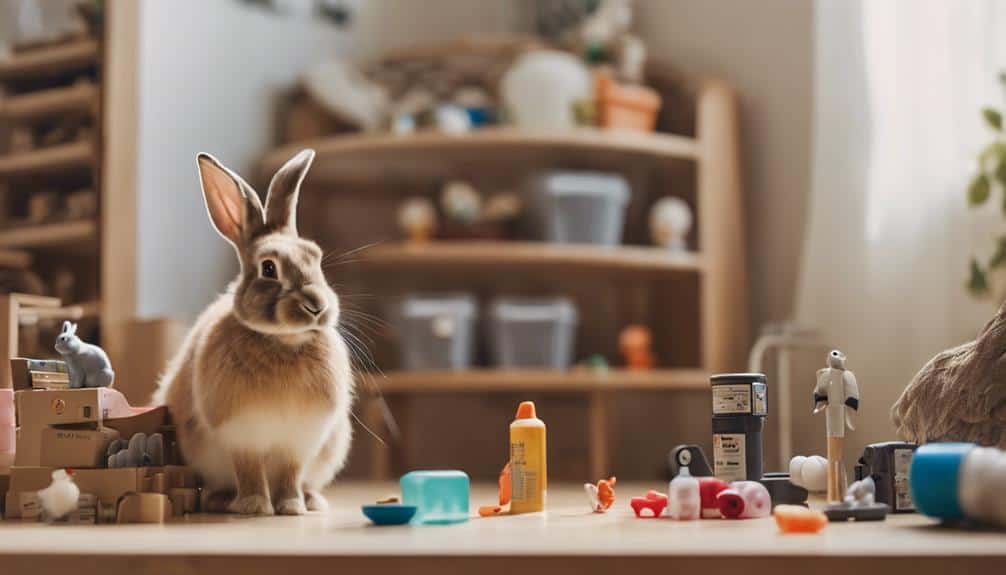
So you're thinking of getting a pet rabbit? That's great, but before you bring one home, it's essential to understand the long-term commitment and responsibilities involved in caring for these social animals.
Rabbits can live for 10 years or more, which means you'll need to dedicate a significant amount of time and resources to caring for them. They need plenty of space to thrive, including a large cage and a rabbit-proofed room where they can exercise and stretch their legs. Providing them with opportunities for physical activity is vital for their well-being, so be prepared to give them plenty of room to hop around.
In addition to space and exercise, spaying and neutering are must-haves to prevent health issues and behavioral problems in rabbits. These procedures not only contribute to the rabbit's quality of life but also help manage the rabbit population responsibly.
It's also crucial to understand that rabbits require regular veterinary care, a proper diet, and social interaction to stay healthy and happy.
Rabbit Care Essentials
When it comes to caring for your rabbit, one of the most important things to remember is that they need a safe and spacious enclosure to thrive. Without enough room to move around and exercise, your rabbit can get bored, stressed, and even sick.
The enclosure should be escape-proof and protected from predators. It should also be easy to clean and well-ventilated. You'll want to add hiding places, toys, and climbing structures to keep your rabbit entertained and stimulated.
In addition to a great enclosure, providing a balanced diet is essential to your rabbit's overall health and well-being. Rabbits are herbivores, which means they eat plants and plant-based foods.
They need a high-fiber diet that's rich in hay, grass, and vegetables. A good quality pellet specifically formulated for rabbits should make up a small portion of their diet.
Fresh veggies and fruits should be given daily, but in limited amounts to avoid digestive upset. Fresh water should always be available, and changed frequently to ensure it's clean and fresh.
Housing and Enclosures
To keep your rabbit happy and healthy, you'll need to provide a spacious and well-ventilated enclosure that meets their physical and behavioral needs.
Size really does matter when it comes to your rabbit's enclosure. The space should be at least three hops long and twice as wide as your rabbit. This will give them plenty of room to exercise and move around freely.
Wire floors can be a real problem for rabbits. They can cause foot injuries and discomfort, so it's best to opt for solid flooring instead.
Make sure your rabbit has some cozy spots to hide and feel secure. You can add cardboard boxes or tents to give them a sense of privacy and security.
Diet and Nutrition
Proper diet and nutrition are really important for your rabbit's overall health and well-being. Since rabbits are herbivores, they need a diet that's high in fiber. Grass hay is a crucial part of their diet, and it's essential for maintaining their digestive health.
Leafy greens like kale, spinach, and collard greens are super nutritious and provide a great variety in their diet. It's vital to give your rabbit a diet that meets their specific nutritional needs to keep them healthy and prevent illnesses. A balanced diet is key to supporting their digestive health and overall well-being.
So, what should their diet look like? Here's a rough breakdown:
| Diet Component | Percentage |
|---|---|
| High-Quality Hay | 80% |
| Fresh Vegetables | 10-15% |
| Pellets | 5% |
| Fresh Fruit | up to 5% |
This means your rabbit should be eating mostly high-quality hay, with some fresh veggies and limited pellets and fruit. By following this diet, you'll be giving your rabbit the nutrients they need to thrive.
Adopting Vs. Buying a Rabbit
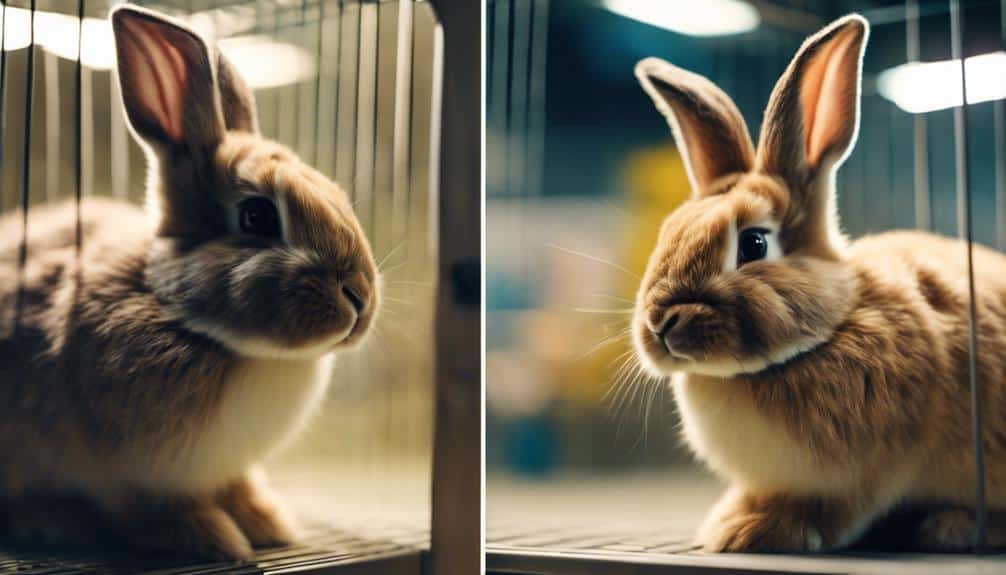
So you're thinking of bringing a rabbit into your family?
That's great! But before you make a decision, it's worth thinking about whether you should adopt a rabbit or buy one.
Adopting a rabbit is a wonderful way to give a loving home to an animal that really needs it. Plus, it helps reduce the number of unwanted rabbits in shelters. It's a win-win!
On the other hand, if you decide to buy a rabbit, you'll need to do your research and make sure you're buying from a breeder who treats their animals with care and respect.
And remember, you'll be committing to give that rabbit a forever home, which is a big responsibility.
Ultimately, the decision to adopt or buy a rabbit is up to you.
But either way, you'll be bringing a new furry friend into your life, and that's definitely something to get excited about!
Adoption Benefits
When you're ready to bring a rabbit into your life, consider adopting from a shelter or rescue group instead of buying from a pet store or breeder. There are several benefits to adopting a bunny.
For one, rabbits from shelters and rescues are often already socialized and healthy. They've received proper care before being available for adoption, which means they're more likely to be friendly and energetic. Plus, they've probably already gotten any necessary vaccinations and medical care.
The people who work at shelters and rescue groups are also super knowledgeable about bunny care and behavior. They can give you valuable advice on how to choose the right rabbit for your lifestyle. They can tell you about the rabbit's personality, habits, and needs, so you can make a more informed decision.
Adopting a rabbit can also be more cost-effective than buying one. Many shelters and rescue groups offer adoption packages that include benefits like spay or neuter services, vet visit certificates, and sometimes even starter kits with food and supplies. This can make the transition to rabbit ownership a lot smoother and more affordable.
Purchasing Considerations
When deciding between adopting or purchasing a rabbit, there are some key factors to consider to ensure the best choice for both you and the bunny.
Buying a rabbit gives you the option to choose from specific breeds, but it can be pricey, ranging from $50 to $200 or more. However, reputable breeders prioritize the health of their rabbits, making sure they're well-cared for before being sold.
On the other hand, adopting from a shelter or rescue not only provides a loving home to a rabbit in need, but it's also often more cost-effective. Many shelters offer already spayed or neutered rabbits, which reduces the initial cost and effort of caring for a new pet.
The adoption fee usually covers benefits like vaccinations and microchipping, saving you money on veterinary care. Additionally, some shelters provide trial periods or 'foster-to-adopt' options, allowing you to spend time with the rabbit before making a long-term commitment.
This can help you avoid potential health problems down the line.
Ethics of Breeding
So, you're thinking of bringing a rabbit into your life, and you're wondering whether to buy from a breeder or adopt from a shelter. This decision involves some important ethical considerations about breeding practices.
When you opt for a rabbit from a responsible breeder, you can be sure the animals are well cared for and bred ethically. This reduces the risk of health issues that are commonly found in poorly bred rabbits.
On the other hand, there's a major problem with rabbit overpopulation. By supporting responsible breeding practices, you're helping to combat this issue, which often leads to neglect, abandonment, or even euthanasia.
However, adopting from a shelter is also a great option. Not only do you give a loving home to a rabbit in need, but you're also reducing the demand for rabbits bred in mass quantities for pet stores. This is a great way to promote adoption and make a positive impact on the lives of these adorable creatures.
Rabbit Housing Requirements
So you want to make sure your rabbit has a happy and healthy life.
The first step is to get them a spacious hutch that meets their needs. Believe it or not, rabbits need a lot of room to move around, even though they're pretty small.
A good rule of thumb is to get a hutch that's at least 2x4x4 feet. This will give your rabbit enough space to stretch out and hop around. The hutch should be at least twice as wide as your rabbit, and it should have a dark, quiet area for them to rest and a lighter, bigger area for exercise and going to the bathroom.
Wooden hutches are a great choice because they're well-ventilated, which means they won't get too hot. Avoid metal hutches, as they can heat up quickly. Also, make sure the floor isn't made of wire, as this can hurt your rabbit's feet.
To keep your rabbit calm and stress-free, add some hiding places like tunnels or boxes. It's also important to keep the hutch shaded, even on cooler days. You can even add some frozen drink bottles or ice bricks to the nesting area to keep it cool.
Rabbit Health and Vet Care
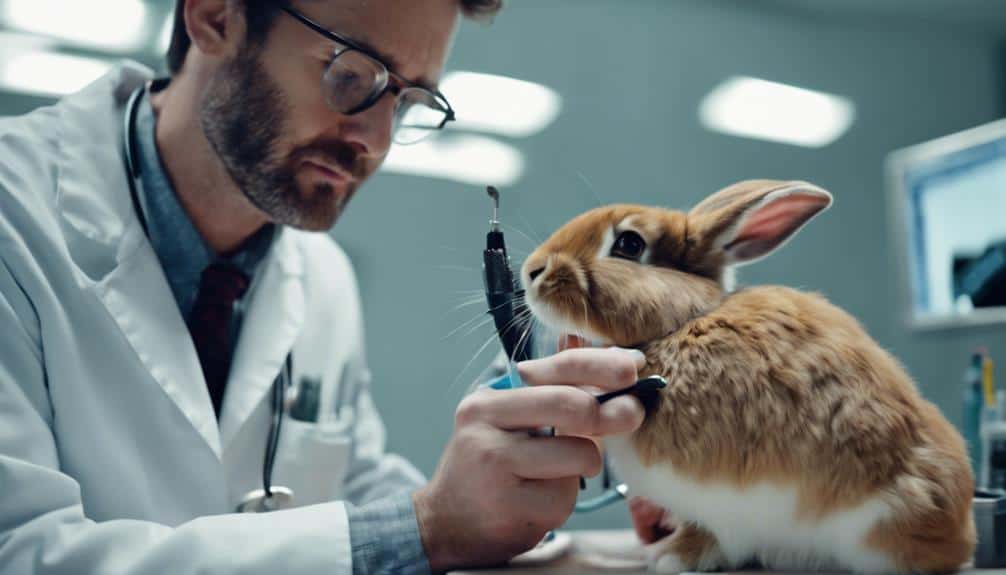
When it comes to keeping your rabbit healthy, regular health checks and vet care are crucial. Rabbits can be prone to health problems, so it's essential to stay on top of things.
One key part of this is getting your rabbit checked by a vet every year. Rabbits need specialized care, and a vet who knows about rabbits can spot any potential issues early on.
It's also a good idea to be prepared for emergencies. Veterinary care for rabbits can be expensive, so it's a good idea to have some money set aside for unexpected medical bills.
Make sure you have a reliable vet who knows about rabbits, just in case.
Spaying or neutering your rabbit can also be a good idea. This can help prevent certain health problems, like uterine cancer, and can also help with behavior issues.
Rabbit Socialization Needs
Rabbits are social animals that need regular interaction to thrive. Without it, they can get bored and unhappy. They need several hours of attention every day, which can be as simple as petting them, talking to them, or playing games with them.
Rabbits love being around people and enjoy activities that stimulate their minds, like playing with toys or running through tunnels. This interaction is crucial for their happiness and well-being. When they're happy, they show it in various ways, such as licking, nudging, or jumping around with joy.
To build a strong bond with your rabbit, you need to create a safe and calm environment where they feel secure. Rabbits are sensitive animals that require gentle handling and patience. If you neglect their socialization needs, they can become lonely, depressed, and develop behavioral issues.
Pros of Having a Rabbit
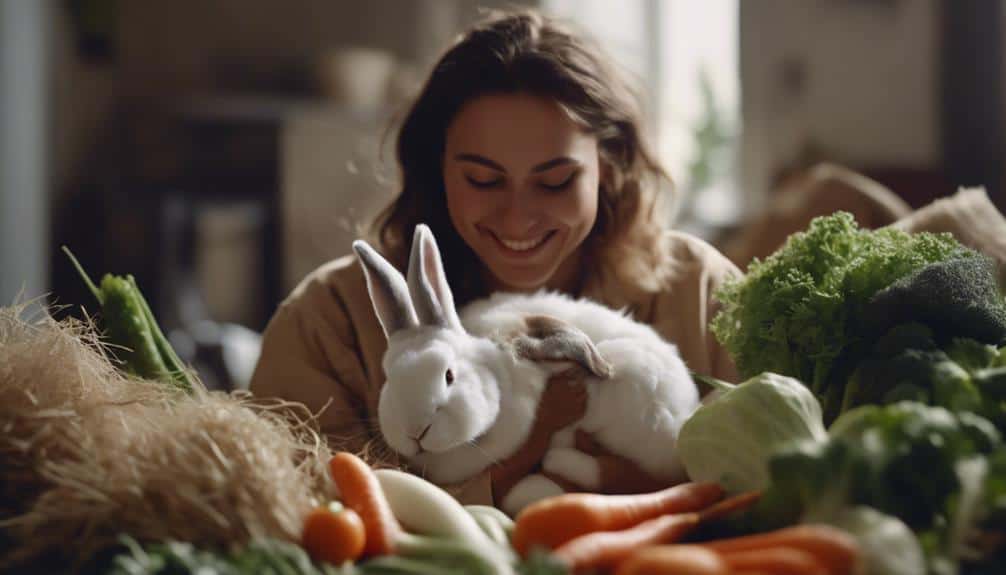
Considering the numerous benefits rabbits offer as pets, it's worth exploring the advantages of having a rabbit in your home.
Rabbits aren't only adorable but also brimming with personality, making them wonderful companions that can bring joy and entertainment into your life. They're great indoor pets, and their charming nature can brighten up your daily routine.
One of the biggest advantages of having a rabbit is that they're low maintenance. Compared to dogs and cats, rabbits require less space and exercise, making them an ideal choice for individuals living in small apartments or those with busy schedules.
You don't need to worry about taking them out for long walks or providing a huge backyard for them to run around in.
Rabbits are also intelligent animals that can be trained to do tricks and obey commands, adding a fun and interactive element to pet ownership.
You can teach them to do cool stuff, and they'll even learn to listen to you.
Rabbits can make a significant positive impact on your life with their unique qualities, making them a great addition to your household.
Cons of Having a Rabbit
Owning a rabbit isn’t all fun and games. There are some significant challenges you should think about before bringing one home. For instance, rabbits require a lot of attention and care, which can be difficult to balance with a busy college schedule. Additionally, they need a proper living environment and diet to thrive, making owning a rabbit in college a more demanding commitment than many may anticipate. It’s important to consider whether you can provide the necessary time and resources before making this decision.
For starters, rabbits need a lot of space to thrive. That means you'll need a large enclosure and litter box, which can be expensive and take up a lot of room in your home.
You'll also need to dedicate a big chunk of your day to interacting and playing with your rabbit – we're talking at least four hours daily. Rabbits are social animals, so they need regular human interaction to stay happy and healthy.
Another thing to consider is that rabbits have sensitive stomachs, which makes their diet and health care needs more complicated than those of other pets.
And with a lifespan of up to 10 years, you're committing to caring for your rabbit for a long time.
Oh, and did we mention that rabbits are most active during dawn and dusk? That mightn't fit with your daily routine, especially if you're not a morning person.
Rabbit Ownership Conclusion
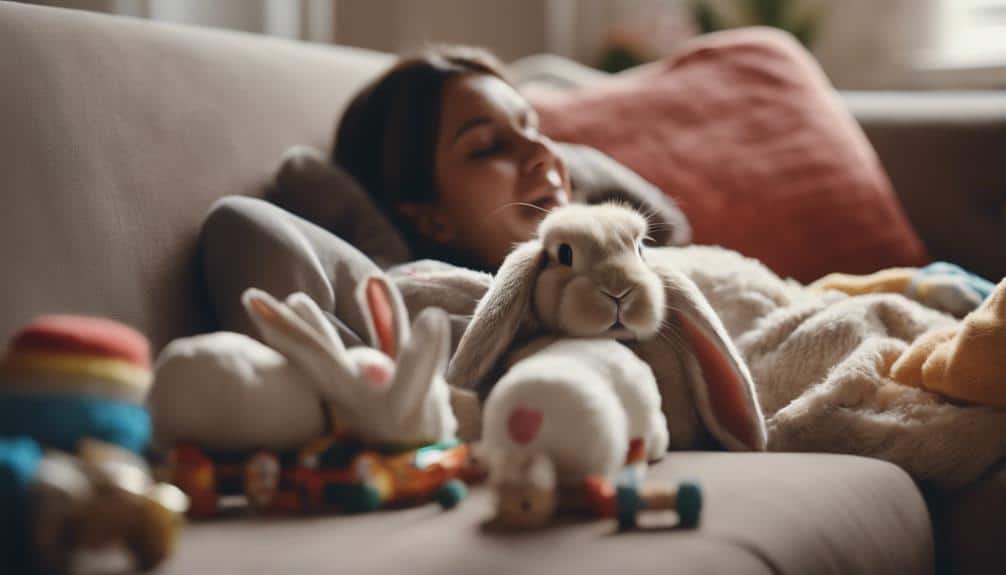
For a fulfilling rabbit ownership experience, understanding and meeting your rabbit's specific needs is essential. Rabbits live for a long time, so it's vital to make sure you're ready for the commitment.
Before bringing a rabbit into your home, take the time to research their dietary requirements, exercise needs, and social behaviors. This knowledge will help you provide the best care for your furry friend.
You'll also need to make sure you have sufficient space for your rabbit. They need ample room to hop around, stretch their legs, and explore. Verify you have a suitable enclosure that allows for exercise and enrichment activities.
To keep your rabbit healthy, prioritize regular veterinary check-ups, a balanced diet, and a clean living environment. This is essential for your rabbit's well-being and will guarantee a happy and thriving companion.
Conclusion
So you're thinking of getting a rabbit? Before you bring one home, remember that taking care of a rabbit is kind of like tending to a delicate garden. It needs attention, care, and patience to grow and thrive.
If you're willing to put in the effort, having a rabbit can be super rewarding. They can bring so much joy and companionship into your life.
But before you make a decision, make sure you have what it takes to give your rabbit the best life possible. Do you have enough space in your home for a rabbit to roam around and play?
Do you have time to clean their cage, feed them, and give them attention every day? And are you prepared to deal with the costs of owning a rabbit, like vet bills and food?
If you've thought it through and you're ready to make a commitment, having a rabbit can be an amazing experience. Just remember to choose wisely, and your rabbit will reward you with love and companionship for years to come.






